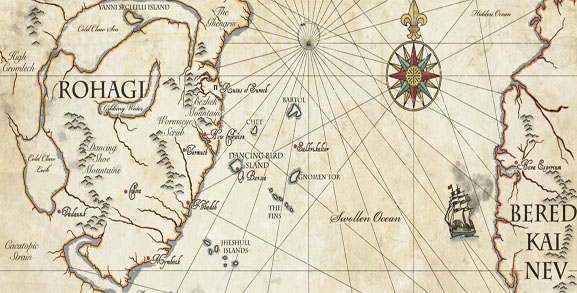Although I, like many my age, sharpened my literary fangs on the fantastical works of C.S. Lewis and Frank L. Baum, I’ve come to the sobering realization that precious few of these worlds offer the amenities necessary for a long, comfortable life. The lack of wireless Internet in combination with the likelihood of death at sword point has made me grateful for the comfy mundane. What follows is a list of eight popular fantasy worlds that I’ve deemed thoroughly unsuitable for modern, human life.
Middle-earth
In a 2011 interview, Sir Ian McKellen told Vanity Fair writer Eric Spitznagel, “There’s no sex in Middle-earth.” This is one of those revelations that is momentarily shocking—especially considering the sheer amount of fan-fiction devoted to man-on-elf action—but is entirely digestible upon further investigation. Life in Tolkien’s world of hobbits, elves, and orcs is all work and no play. There really is no sex in Middle-earth, as evidenced by the truly vanilla love affair between Aragorn and the elf-princess Arwen. On top of that, the only mind-altering substance available is the One Ring, and well… there’s only one of those.
All-World
Living in the setting for Stephen King’s Dark Tower series would be just plain confusing. In addition to hosting a mélange of genre-specific entities (dragons, cowboys, even computers), everything is ascribed such vague toponymy—In-World, End-World All-World, the Waste Lands (Topeka?)—making navigation obnoxiously difficult.
Narnia
C.S. Lewis’ land inside the wardrobe is the stuff of
childhood dreams. I’m sure I’m not alone in having frequented the back reaches
of household closets as a child, groping for snow or leaves or a satyr’s tail.
However, had the front hall closet actually swallowed me up and spat me into
Narnia, I’m sure the novelty would have worn off. I mean, you cannot get a
moment of peace and quiet in that world. Everything talks: beavers, birds, even
the trees. And how is even a vegetarian, let alone a regular eater, supposed to
enjoy an evening meal when your asparagus tries to chat you up?
Westeros
A friend of mine, who recently started watching Game of Thrones on HBO, described George R. Martin’s world as “the land of boobs and stabbing.” In fact, I’m pretty sure he stole that from a Westerosi license plate. In theory, constant boobs and stabbing would make for an exciting life. But living in a world where everyone has likely been stabbed at least once, lost a finger, been sexually violated, and/or attacked by a walking corpse would probably get tiresome fast. Also, their seasons last for decades, which is a meteorological anomaly I could never get used to. Twelve years of February? Just stab me now and let’s be done with it.
Wonderland
If Middle-earth is Land of the Prudes, then Wonderland is its literary antipode. And just as the teetotalers of Gondor are sword-wielding killjoys, the denizens of Lewis Carroll’s corporeal fever dream are just too much to handle. Who wouldn’t want to live in a subterranean dictatorship where everyone is under the influence, up is down, and down is up? Not I. If I ever need a dose of abstruse, hallucinogen-driven conversation, I’ll just go to Burning Man.
Oz
How are you supposed to maintain polite conversation with a purple-haired, ball-shaped, one-legged next door neighbor? Virtually every other citizen in Frank L. Baum’s technicolor dream world is physically deformed in some manner—the red-skinned Quadlings, the diminutive Munchkins, armless Hammer-heads, the vegetal Mangaboos, and the pancake-faced Flatheads. To live in a world populated by such anatomical oddities would be a constant exercise in political correctness. Is the grocer armless or extremity-disabled? Is your co-worker a winged monkey or an “avian-simian?” Exhausting.
Bas-Lag
The world in which China Miéville’s novels are set is the Williamsburg of fantasy worlds. It is populated by such eye-rollingly obscure mythical denizens as “garudas,” “vodyanoi,” and “grindylows,” and a few more recognizable creatures that can’t help but make a desperate stab at originality. Take care to ensure you’re spelling “vampir” sans suffixal “-e” (the authentic Slavic name), or you might provoke someone into using “thaumaturgy” (magic) on you.
Prydain
The Welsh language is notoriously difficult to pronounce. Rumor has it Welsh scholars purposely made it so when they adopted the Roman alphabet in an effort to piss off their English conquerors. Mission accomplished, Wales. Job well done. Lloyd Alexander’s Prydain (of Black Cauldron fame) is a world birthed from Welsh mythological traditions. Appropriately, everyone and everything has an unpronounceable Welsh name. Fflewddur Fflam? Gesundheit.
Credit, from top to bottom: Flickr user gothic_sanctuary. Le Figaro. StephenKing.com. NarniaWeb.com. GameofThrones.net. Public Domain (2). Wikipedia Commons. Original scan from book.













 A Black Balloon Publication ©
A Black Balloon Publication ©